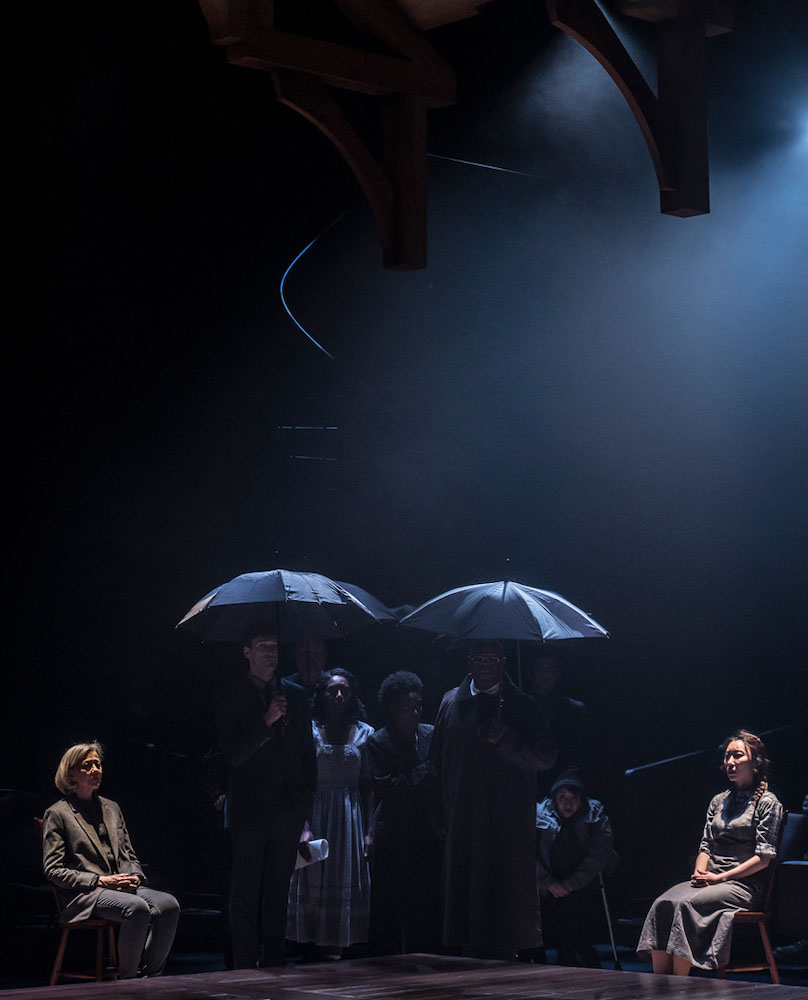“He wrote Jane a letter and on the envelope the address was like this: It said: Jane Crofut; The Crofut Farm; Grover’s Corners; Sutton County; New Hampshire; United States of America… Continent of North America; Western Hemisphere; the Earth; the Solar System; the Universe; the Mind of God — that’s what it said on the envelope… And the postman brought it just the same.” — Rebecca Gibbs, Our Town
Our Town, now at the Shakespeare Theatre, feels and sounds like a poem. Watching and listening to it is like being inside a soap bubble that is blown into the air and gently caught as it descends in such a way to prevent its bursting. As the play delves into its subject of life and death, the hearts of the audience are treated with tender and gentle grace.
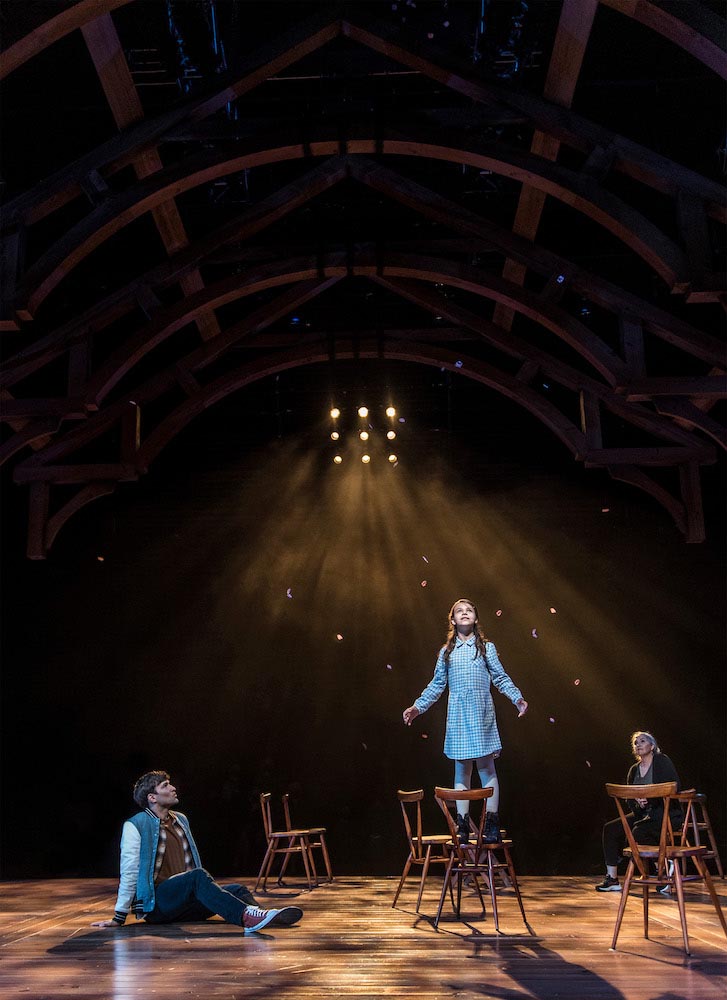
There are a couple of questions that this disarmingly comforting production of Our Town raises for me: 1) What does the “mind of God” look like? and 2) Who is meant to be included in the word “our” in the title Our Town?
An answer to the first question is proposed the moment we enter the theater and are confronted with the set (Wilson Chin). What we see evokes both an arena in a Roman amphitheater that would be used for gladiatorial combats and the arches of the sanctuary of a rural American church. It’s a harrowing and holy space in which we witness both the momentous and the everyday in the lives of the citizens of Grover’s Corners. It suggests that in everything that happens in human lives, no matter how seemingly unimportant, the stakes are always life and death, and we would do well to pay attention to where we are, who we’re with, and what we are doing in every moment.
Wikipedia refers to Thornton Wilder’s Our Town as a “metatheatrical three-act play.” I take this to mean that not only is Our Town not trying to be anything other than an artificially constructed narrative; it glories in its artifice and it insists that we — the audience.— be aware of and collude in the creation of that artifice as well.
The play is divided into three acts: Act I, Daily Life; Act II, Love and Marriage; Act III, Death and Eternity.
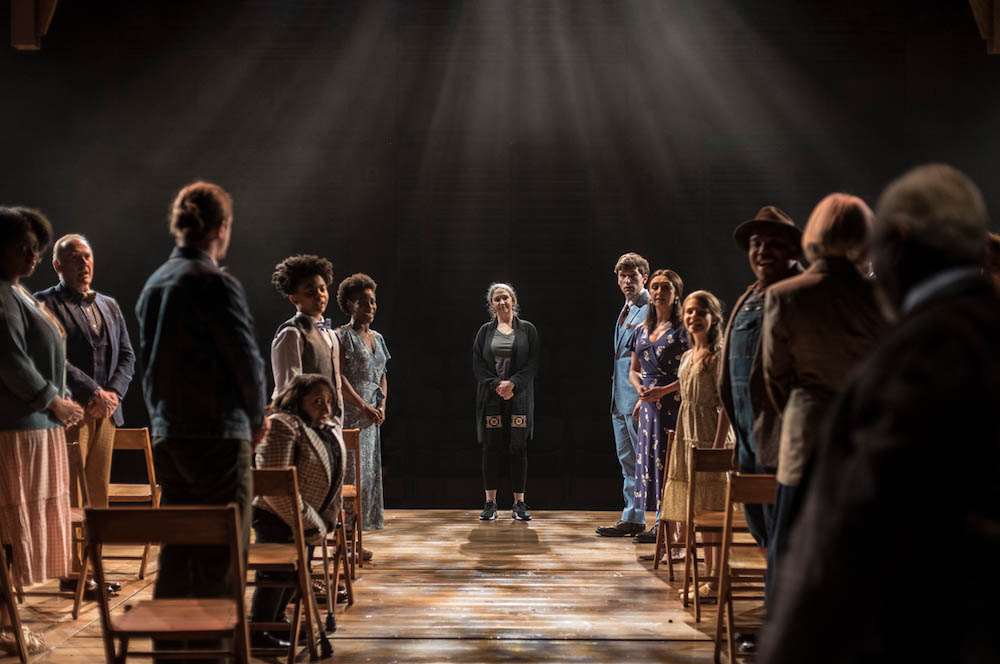
Throughout the play, The Stage Manager (Holly Twyford) provides context for the action and determines what action the audience gets to see and what action the people of Grover’s Corner get to present in front of the audience. The Stage Manager often stops the action of the play when it is determined that the audience has enough information.
In Act I, we are introduced to all the characters and their roles in the community, their dreams, aspirations, and their problems — especially the neighboring families the Gibbs and the Webbs and their children George Gibbs (Jake Loewenthal) and Emily Webb (Chinna Palmer)
In Act II, the Stage Manager brings us into the lives of Grover’s Corners three years after Act I. We arrive at the wedding of George and Emily. In flashback, the Stage Manager has the actors show us the events of the past three years that lead us to the current ritual of marriage.
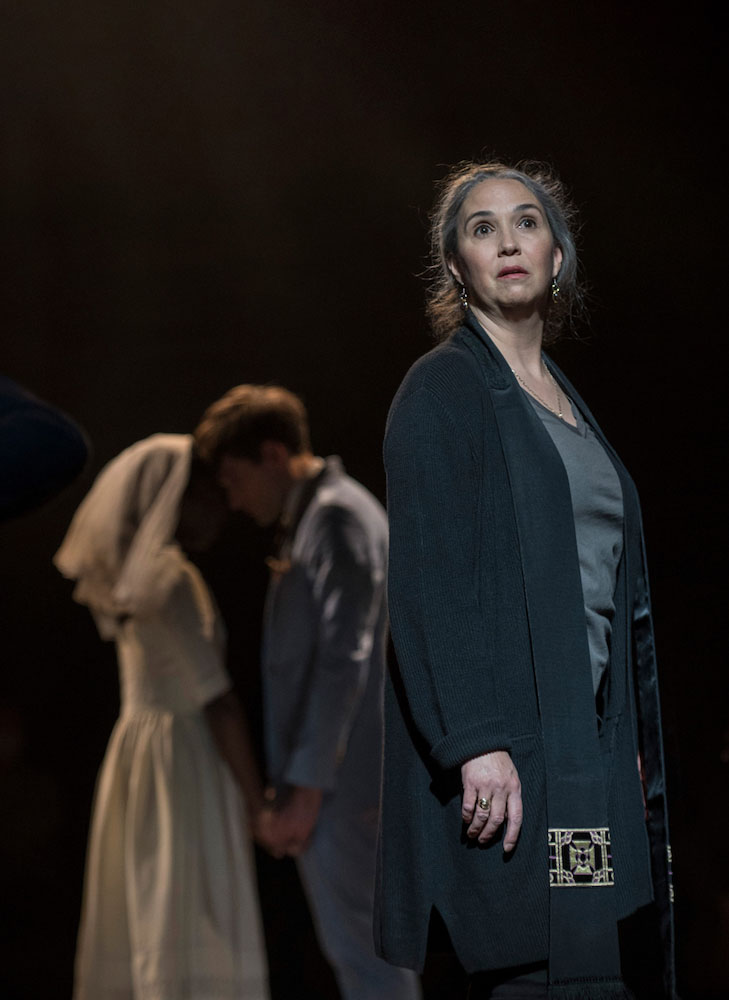
In Act III, the Stage Manager places us in Grover’s Corners nine years after Act II at a graveyard where we get to hear from the dead as well as from the grieving.
The play is not so much about the plot it presents as it is about how and why a particular culture tells its stories to the people who are members of that particular culture — and to outsiders. By insisting on the audience’s collusion in the creation of the artifice of this storytelling, the Stage Manager reminds us that we are responsible for the life of these fictional characters and that their stories actually are ours: “The real hero of this scene isn’t on the stage at all, and you know who that is.” Going further, the Stage Manager notes: “We all know that nature’s interested in quantity, but I think she’s interested in quality, too, — that’s why I’m in the ministry.” In addition to being one long poem, then, Our Town is also a ritual, a parable, a sermon.
In his notes, Shakespeare Theatre’s resident dramaturg, Dr. Drew Lichtenberg, places the second question of who is to be included in the “our” part of Our Town front and center with his observation that in the first act of Our Town, “the customs, conventions, and beliefs of a very specific White Anglo-Saxon Protestant community are seen from an archaeological perspective.”
In describing the population of the area itself, the play text notes: “Early Amerindian stock Cotahatchee tribes…no evidence before the tenth century of this era…hm…now entirely disappeared…possible traces in three families.” It’s an acknowledgment of previous occupants of the land. Unlike our current land acknowledgment statements, which can sometimes be academic and cautious, Wilder’s statement leaves a roaring vacuum around the phrase “entirely disappeared.”
This question seems especially pointed in these days of rapid and violent reclamation of property, space, and resources around the globe by people calling themselves white Christians. To put on this play with its specificity of culture in a city that for a short while was known as “Chocolate City” begs for us to pay attention.
In his foreword to the play, David Margulies notes that “in [Grover’s Corners’] specificity it becomes all towns. Everywhere. Indeed, the play’s success across cultural borders around the world attests to its being something much greater than an American play: it is a play that captures the universal experience of being alive.”
The uniformly excellent performances, directed beautifully by Alan Paul, made me feel lucky to live in an area where such skill and artistry are available to us on a regular basis.
Due to COVID, there were six understudies in the performance that I attended: Erin Weaver (Professor Willard), Todd Scofield (Dr. Gibbs), Ryan Neely (Constable Warren), Quinn M. Johnson (Joe Crowell/Si Crowell), Kiana Johnson (Ensemble), and Elliot Dash (Mr. Webb). They all comported themselves splendidly in their roles. Erin Weaver was hilarious in her portrayal of Professor Willard’s obsessive and nerdy passion for the geography and sociology of Grover’s Corners. Dash and Scofield as the Webb and Gibbs family patriarchs were both effective and affecting. Dash’s controlled and resonant basso effused steadiness, accomplishment, responsibility, civic accountability, and a masculine tenderness whenever he spoke. Both Scofield and Dash had scenes with Jake Loewenthal’s George Gibbs (as his father and father-in-law, respectively) that gave them a chance to demonstrate the juggling act of fatherly responsibility with fatherly tenderness.
In an early scene with his soon-to-be romantic interest, Loewenthal’s George was delightful, demonstrating how saying the word “yeah” with precisely the same intonation, over and over, could express a wide variety of emotionally disparate states. Chinna Palmer as Emily Webb embodied a hopefulness, an unselfconscious and youthful intellect that was so filled with possibility. Felicia Curry and Natascia Diaz brought their usual commitment and excellence to play as the matriarchs of the Webb and Gibbs families. And with the ever-reliable Holly Twyford as our narrator, organizer, and pastoral guide, we come to rely on her understanding, experience, and interpretation of what we are seeing and feeling as we watch the events of one town’s life unfolding before us.
The sound design (John Gromada), so important in a show with very little visual information on which to establish place, was assertive in its evocation of time and distance: the distant sound of the train whistle, the closer factory whistle, the milk bottles clinking right in front of you.
This play, and this production of it specifically, is an invitation and an argument for us to courageously own the fact that we all have a right to be and belong in this town. And that this country and this world is a trust that — whether we want to or not — we share and are responsible for in common, in all of its diversity: in all our humanity and its sacredness.
Running Time: Approximately two hours 30 minutes, including one 15-minute intermission and one 10-minute intermission.
Our Town plays through June 11, 2022, at Sidney Harman Hall, 610 F Street NW, Washington, DC. For tickets ($35–$120), purchase online or call 202.547.1122.
The program for Our Town is online here.
COVID Safety: Patrons must provide proof that they are fully vaccinated against COVID-19 in order to attend any performance or public event at Shakespeare Theatre Company. Masks are required for all guests inside, except while eating or drinking in designated locations. Shakespeare Theatre Company’s complete COVID Health and Safety guidelines are here.
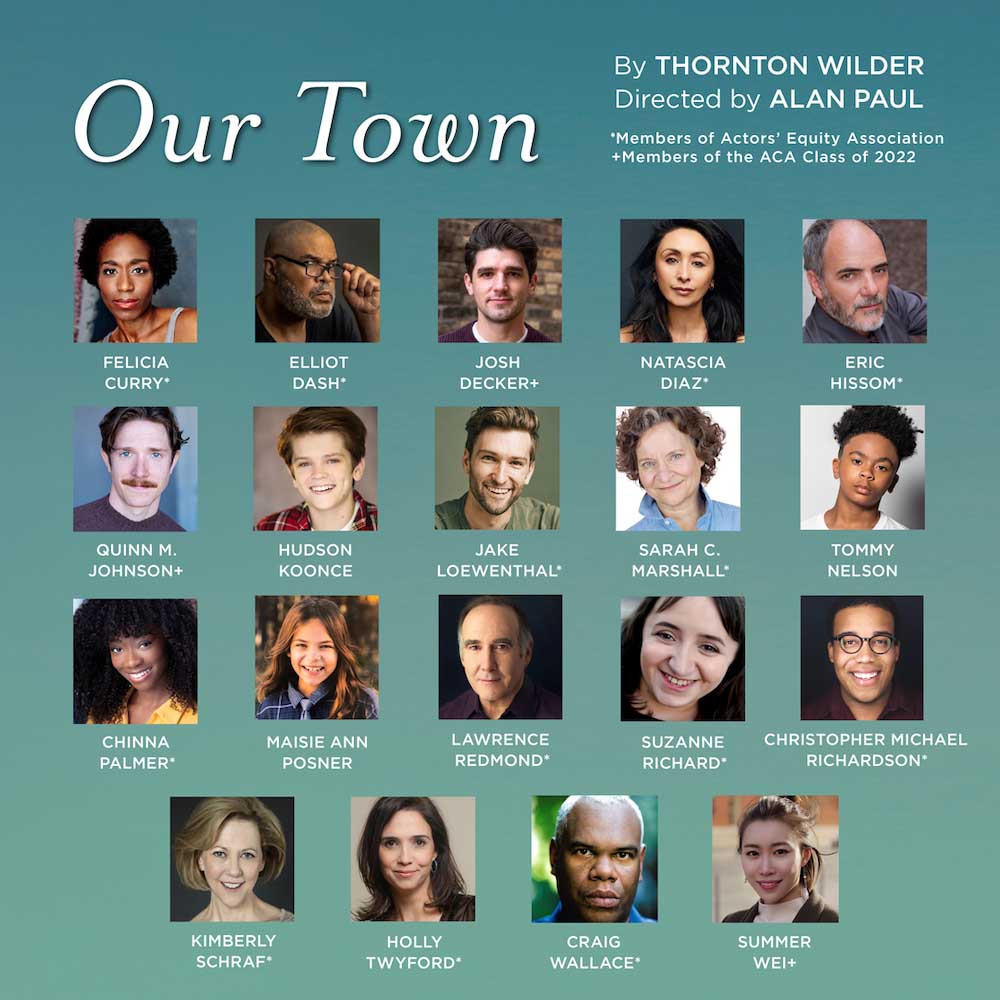
Our Town by Thornton Wilder
Directed by Alan Paul
Stage Manager: Holly Twyford
Dr. Gibbs: Eric Hissom
Joe Crowell: Hudson Koonce
Howie Newsome: Christopher Michael Richardson
Mrs. Gibbs: Natascia Diaz
Mrs. Webb: Felicia Curry
George Gibbs: Jake Loewenthal
Rebecca Gibbs: Maisie Ann Posner
Sam Craig: Josh Decker
Wally Webb: Tommy Nelson
Emily Webb: Chinna Palmer
Professor Willard: Kimberly Schraf
Mr. Webb: Craig Wallace
Simon Stimson: Lawrence Redmond
Mrs. Soames: Sarah C. Marshall
Constable Warren: Elliot Dash
Si Crowell: Hudson Koonce
Joe Stoddard: Suzanne Richard
Ensemble: Quinn M. Johnson
Ensemble: Summer Wei
Scenic Designer: Wilson Chin
Costume Designer: Sarafina Bush
Lighting Designer: Philip Rosenberg
Sound Designer: John Gromada
Composer: Michael John LaChiusa
Music Director: Jay Crowder
Mime and Movement Directors: Mark Jaster, Emma Crane Jaster
Resident Dramaturg: Dr. Drew Lichtenberg
Assistant Directors: Jacob Ettkin, Max J. Kelly
Voice and Text Coach: Lisa Beley
Intimacy and Fight Consultant: Lorraine Ressegger-Slone
Production Stage Manager: Joseph Smelser
Stage Manager.: Anthony O. Bullock
Assistant Stage Managers: Alison R. Simone, Jossie van Dongen
Resident Casting Director: Danica Rodriguez
SEE ALSO:
All-local cast to play ‘Our Town’ at Shakespeare Theatre Company (news story)


